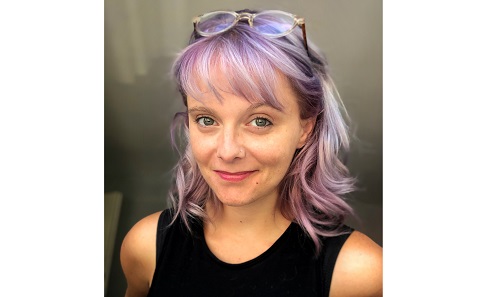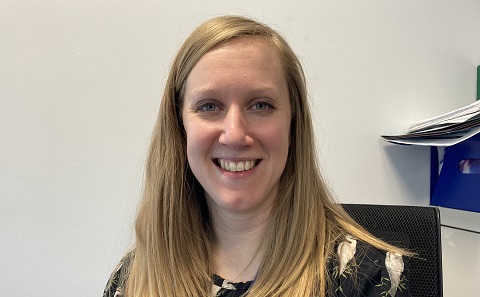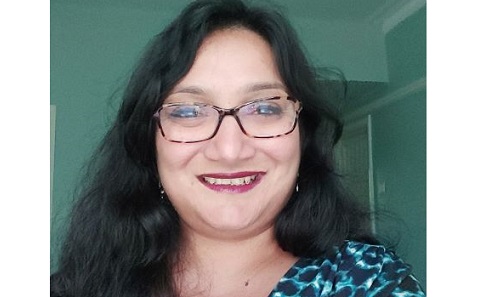International Day of Women and Girls in Science - 11th February
In 2015, the United General Assembly declared 11th February as International Day of Women and Girls in Science.
There is still a significant gender gap in STEM subjects (science, technology, engineering and maths) at schools, and despite progress in the last few decades, women are still under-represented in these areas in higher education and the workplace. The aim of IDWGS is to address this gap, encourage young women to follow STEM subjects and careers, and provide positive role models for young girls.
To mark International Day of Women and Girls in Science, we spoke to two staff members whose love of science and STEM subjects has influenced their education and careers. And watch a video of one of them answering nine-year-old Hanne's questions about science at the bottom of the page.
Dr Charlotte Stuart - Clinical Trials Data Manager

What STEM subjects did you study?
I grew up in South Africa, but I studied my A-levels doing distance-learning with tutors in the UK and chose to take Biology, Chemistry, Physics and Maths. I had tutors for each subject once a week instead of going to school. There was no course work and my whole grade relied on exams at the end (which was very stressful!)
I moved to England at 18, took a gap year and then started an undergraduate degree in Natural Sciences BSc (Hons) through the Open University (more distance learning!). Finally, after working as lab technician first for a few years I then did a PhD in Clinical Neuroscience at University of Southampton, studying how systemic inflammation impacts brain diseases like Multiple Sclerosis and Alzheimer’s.
Did you always like STEM subjects and were you always good at them?
I always loved science, especially biology. I was fascinated by nature and understanding how our world works. And I was good at it which helped . Maths was a different story, I hated it. Both at A level and even now, it takes me a long time and lots of scribbling on paper to figure out a maths problem and often I have to ask for help, but I've got a lot better at it! Just because maths doesn’t come naturally to me doesn’t mean I can’t still do it - by slowly and methodically working my way through it or getting help.
Did you always want to go into a career using STEM subjects or did this come later?
I had an uncle who was a scientist and inspired me to be one from a young age. I never knew what kind of science I wanted to do, I just sort of fell into the world of medicine and clinical trials – and I love it!
How do you use your science background in your current job?
My current job doesn’t require too much of the theory I learnt, but more of the practical skills I gained from studying science like problem solving, planning, data collection, and how to ensure the data is actually of good quality, which is very important for clinical trials!
What advice would you give to girls and young women who are interested in a career in science but feel they are not good enough or are put off STEM subjects?
I spent my whole school and undergraduate life thinking I had to get straight As and be the smartest to be a scientist, and I wish I could go back and tell myself to stop worrying so much and to focus on things other than academics. It turns out the skills you need to be a good scientist aren’t in text books or on exam papers. You just have to be curious and willing to learn new things. There are so many different kinds of jobs within STEM, really something for everyone.
I’m really excited for more women to enter the world of STEM, especially medicine. There are so many areas of research where, historically, there have been no women involved and the woman’s point of view on important subjects has never been considered. Women make up half of the population, it's about time the research starts reflecting this! The more women in STEM the more we can start improving the lives of women (and other overlooked groups) across the world.
Dr Victoria Goss - Translational Programme Manager
 What STEM subjects did you study?
What STEM subjects did you study?
I studied chemistry and biology at A-level, Chemistry at University and my PhD is in the Biochemistry field.
Did you always like STEM subjects and were you always good at them?
At school I had an incredible Chemistry teacher called Mrs Humphrey who was inspiring and encouraging which led me to my first degree. I have a fascination with the natural world so Chemistry naturally developed into Biochemistry and then how biochemical pathways and processes can alter during disease or when we become ill. I’ve actually always found maths and physics challenging so have had to work hard on these areas to support my other studies.
Did you always want to go into a career using STEM subjects or did this come later?
I grew up on a farm and always thought I would work with animals somehow so my job is quite different to what I thought I would do! During my Chemistry degree I worked in Industry for a year where I worked with an analytical technique called mass spectrometry which led me to my PhD. I then worked as a Post-Doctoral Research Fellow looking at lipid dynamics in Clinical Trials based in Intensive Care. This led me to gain more experience in Trial Management and I am now very lucky to bring together experience from those roles as Translational Lead at SCTU - I am passionate about Translational research and the positive changes it can bring!
How do you use your science background in your current job?
As the Translational lead at SCTU I use my experience from my days in the lab and working in trial management every day. Translational research brings together scientists working at the cutting edge of their field with clinical teams and trial teams to develop and validate novel treatments and diagnostics and then gather the evidence for them to be taken up into clinical care. This work ensures patients are receiving the very best care possible. As part of my role I jointly Programme Manage the iDx-lung study which is looking at four different early diagnosis tests for Lung Cancer. Early diagnosis in cancer is extremely important to improve survival rates and especially in lung cancer where many patients are diagnosed at a late stage so this study could make a very important step forward in this area. I am inspired every day by the ambition of all the teams I work with in my role.
Did you (or do you still) have a STEM role model?
I have been lucky to have worked with, and now work with lots of incredible women who inspire me in the world of STEM. The story that has always stuck with me though is that of Frances Oldham Kelsey who worked at the FDA when Thalidomide was trying to gain approval. Despite significant pressure because the drug had already been approved in Europe and Canada she refused to believe they could provide sufficient evidence that there would be no damage done to the foetus. Due to her strong stance she not only prevented many children being born with birth defects but also paved the way for sweeping changes to the drug approval process in America.
What advice would you give to girls and young women who are interested in a career in science but feel they are not good enough or are put off STEM subjects?
Science can sometimes feel quite daunting, especially as it can seem like they come as a package but it’s ok to have one that you like and others that you don’t or find harder. And remember, we use science every day without even knowing it - cooking, baking and gardening are all science!


 What STEM subjects did you study?
What STEM subjects did you study?